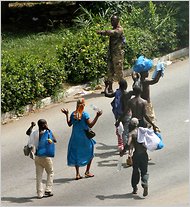France also sent another 300 troops, bringing its peacekeeping forces to about 1,400 in the Ivory Coast, said Col. Thierry Burkhard, a French Defense Ministry spokesman.
Nearly 1,700 foreigners, half of them French, have taken shelter at a French military camp close to the airport, and France acted to ensure that they and others could be evacuated if necessary, Colonel Burkhard said. President Nicolas Sarkozy of France said in a statement on Sunday evening that all the French would be gathered in one place to make evacuation easier and prevent hostage taking.
The United Nations has begun evacuating about 200 civilian employees after attacks on its headquarters, The Associated Press reported, citing United Nations employees who did not provide their names.
Fighting continued on Sunday between troops loyal to the elected president, Alassane Ouattara, and those loyal to the incumbent, Laurent Gbagbo, who refuses to recognize the election results and leave office despite Mr. Ouattara’s election having been endorsed by the African Union. Mr. Ouattara’s forces have swept south to enter the commercial capital, Abidjan, where Mr. Gbagbo remained. French troops were there to support the United Nations mission in the Ivory Coast, known as Onuci, although the French government has said clearly that Mr. Gbagbo lost the election and must leave office. The Gbagbo camp on Sunday called the French, the former colonial rulers of the country, “an army of occupation.”
The United States also called for Mr. Gbagbo to step down immediately in a statement Sunday by Secretary of State Hillary Rodham Clinton. “Gbagbo is pushing Côte d’Ivoire into lawlessness,” she said, using the French name for Ivory Coast. “He must leave now so the conflict may end.” She also called on Mr. Ouattara’s troops “to respect the rules of war and stop attacks on civilians.”
On Sunday, Mr. Ouattara rejected charges by United Nations officials that his forces had massacred more than 200 civilians in the western town of Duékoué. The United Nations mission said that traditional hunters known as Dozos had fought alongside Mr. Ouattara’s troops as they launched an offensive last week to dislodge Mr. Gbagbo. The United Nations also said that forces loyal to Mr. Gbagbo killed more than 100 people in Duékoué.
Late Saturday, the United Nations secretary general, Ban Ki-moon, spoke to Mr. Ouattara, who said his troops were not involved with the killings. As many as 800 people were killed in intercommunal violence in Duékoué, according to the International Committee of the Red Cross.
In a statement, Mr. Ouattara said that his government “notes with regret that the allegations” of the United Nations “are not supported by any evidence after its preliminary investigation” and denied that Dozos were part of its forces.
As many as 1,300 people have died since November in postelection violence. But Mr. Gbagbo’s forces continue to hold the area in Abidjan around his residence, the presidential palace and the state television building.
News agency reports from Abidjan indicated that after a day and night of fierce fighting, the city was relatively calm on Sunday, with sporadic gunfire. But there was a security vacuum in the city, Colonel Burkhard said in Paris, noting that many policemen and security forces who had been serving Mr. Gbagbo’s administration had left their posts.
Efforts by foreign journalists to enter the country from neighboring Ghana were rebuffed on Sunday. There were also indications that Mr. Ouattara’s assertion that his forces control all Ivorian territory were overstated.
At the principal Ghana border crossing adjoining Noé, Ivory Coast, guards armed with Kalashnikov rifles, who said they were on Mr. Gbagbo’s side, told a group of journalists seeking to enter the country that they were not welcome and ordered them to return to Ghana.
In that southern corner of Ivory Coast, at least, Mr. Gbagbo appeared to have the upper hand.
Angrily, another guard, pointing his gun, launched into language that could have come straight from Mr. Gbagbo’s nonstop propaganda channel RTI, the Ivorian state television station that broadcasts belligerent tirades against the United Nations and the French.
“French and Americans, same thing,” the guard said. “Obama and Sarkozy, you just want to kill Africans, and come and take our oil. Now, go back where you came from.”
In Abidjan, a convoy of French journalists in three cars was fired on with sustained rounds as it tried to enter the city Sunday. Earlier, the journalists had been assured by troops loyal to Mr. Ouattara that the road, a principal highway into central Abidjan, was under their control. It was not.
The journalists passed Mr. Gbagbo’s gendarmerie camp of Agban, a redoubt of hardline supporters, and the firing began. “They fired on us with every Kalashnikov they had,” said Dominique Derda, Africa correspondent for the French channel France 2. Car windows were blown out, and the reporters, from French radio and television, considered themselves lucky to have escaped with only minor injuries.
“We were incredibly lucky,” he said. “Of course, the road was not cleared.”
